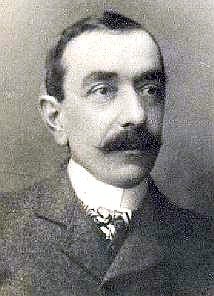The Mays family were prominent in Bourne throughout two centuries and produced not only Raymond Mays, the international motor racing driver and designer, but also several other members who made major contributions to the life of the town. One
of the less well known was George Henry Mays, born in 1859, the second son
of Thomas William Mays (1822-1897), founder of the firm of fertiliser
manufacturers and fellmongers, and his wife Sarah, sister of Sir George
White, who was MP for Norwich. George had a lifelong association with the
family business and at the time of his death, he was one of the principal
directors of the company. He and his elder brother, Thomas William Mays,
joined their father in partnership under the style of Messrs T W Mays and
Sons, and during his time as a principal of the firm, the business was
developed extensively. George
Mays became well known at every market in Lincolnshire and at the
important fellmongering and wool centres. A colleague said at the time of
his death: “His business association with both patrons and employees was
of the most harmonious character and it would be difficult to find two
principals, such as the deceased and his brother, who enjoyed such a
friendly relationship with their employees.” He
took an active interest in the public and social life of the town, heading
the poll for the first elections of parish councillors in the late 19th
century and occupying a similar position at each succeeding parish council
election. He also topped the voting at the first elections for seats on
the newly-formed Bourne Urban District Council in 1889 and he retained
this lead until the last contested election shortly before his death when
the margin was reduced, but it was only by a few votes that he failed to
maintain this unbroken record. In
1897, he became chairman of the then parish council and subsequently
occupied a similar position on Bourne UDC for 1902-3. In addition, he
represented Bourne on Kesteven County Council for almost 20 years, sitting
on the policy-making Standing Joint Committee, and in 1914, he was
appointed a magistrate, sitting on the Bourne bench of justices. He also
served as a trustee of Bourne United Charities for 20 years. During
the First World War of 1914-18, Mr Mays played a prominent part in the
work of the Red Cross which set up a military hospital in the
Vestry Hall for the care of soldiers wounded in the trenches, and he sat on the
Urban Tribunal which heard cases from objectors to
military service. He was also one of the government officials appointed to
manage and control wool supplies from the area and was a member of
the County Agricultural Committee. Like
his brother, Thomas William Mays, he was an enthusiastic motorist and one
of the earliest members of the Lincolnshire Automobile Club, also serving
on the committee. He was a keen sportsman and rider to hounds, following
the Cottesmore and Belvoir Hunts, and in his younger days, played
regularly for Bourne Cricket Club. Among
the many public offices he held during his lifetime were those of chairman
of the Association for the Prosecution of Felons, director of the Bourne
Public Hall Company [the Corn Exchange], a committee member of the Nursing
Association at the Butterfield Hospital and a life member of Bourne
Institute in West Street [now the Pyramid Club]. A Liberal in politics, Mr
Mays took an active role in the establishment of a Liberal Club in the
town and was for several years its president. He was also a religious man, a
member of the established church, but was frequently found rendering
assistance to the free churches of the town. George Mays was in failing health for three years and eventually confined to his bed at his home in Brook House, Eastgate [demolished to make way for the Worth Court residential complex], where he died on Tuesday 9th March 1926. He had married Martha Thornton in December 1882 and they had two children, a son Henry and a daughter Muriel, all of whom survived him. The
respect in which he had been held was reflected in the manner of his
funeral the following Saturday when there were large crowds for the
service at the Abbey Church, conducted by the vicar, Canon John Grinter,
and at the town cemetery where he was buried. Representatives from all
sections of the community attended, including a large number of workers
from the family firm. As the cortege entered the church, the organist Mr W
R Leary, played Blessed are the departed and the service, which was
fully choral, included the hymns Lead, kindly light and On the
resurrection Morning while O rest in the Lord was played as the
coffin left the church, born by six employees, including Messrs W Laxton,
J Darnes, J Sandall, C Clay, G Pick and S Rodgers. The large number of floral
tributes also reflected his popularity and the high esteem in which he was
held. There were wreaths from the County Woollen Merchants Association of
England and Wales, the men at the Dorrington Hide and Skin works,
employees of his own company at their various depots in Bourne and
Peterborough, the local bench of magistrates, Bourne Urban District
Council and the many organisations to which he belonged. See also Bourne Military Hospital Thomas
William Mays
Raymond Mays
Mays and Sons
Go to: Main Index Villages Index
|
